Unlock the rich history of Beijing’s iconic Confucius Temple and Imperial College with a convenient e-ticket. At just $7.20 per person, this experience grants skip-the-line entry and the flexibility to reserve now and pay later. With a full refund available for last-minute changes, planning your cultural exploration has never been easier. Enjoy the architectural marvels and Confucian educational heritage that have shaped China’s past. But what secrets and insights lie within these hallowed halls? Discover the compelling stories waiting to be uncovered.
Key Points
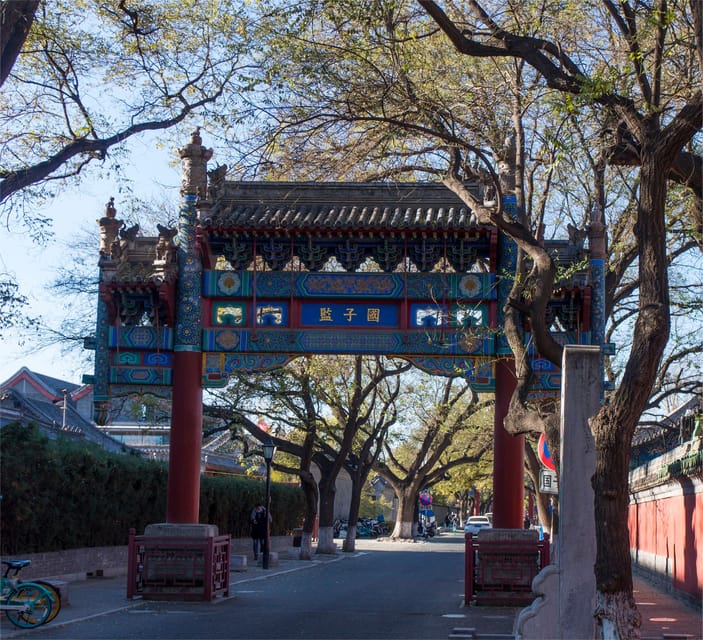
- The Confucius Temple and Imperial College in Beijing offer e-tickets from $7.20 per person with skip-the-line entry, free cancellation, and flexible starting times.
- The Confucius Temple and Imperial College have over 700 years of history, serving as important educational and cultural centers during the Yuan, Ming, and Qing Dynasties.
- The Confucius Temple complex spans 22,000 square meters with three courtyards, while the Imperial College covers 28,000 square meters and features key historical structures.
- Visitors must present their passport or ID card and the e-ticket sent via email upon arrival, as the QR code is not the actual entry ticket.
- The e-tickets for the Confucius Temple and Imperial College are rated 4.6 out of 5 by customers, praising the convenience of the skip-the-line option and the flexibility of the free cancellation policy.
Ticket Information
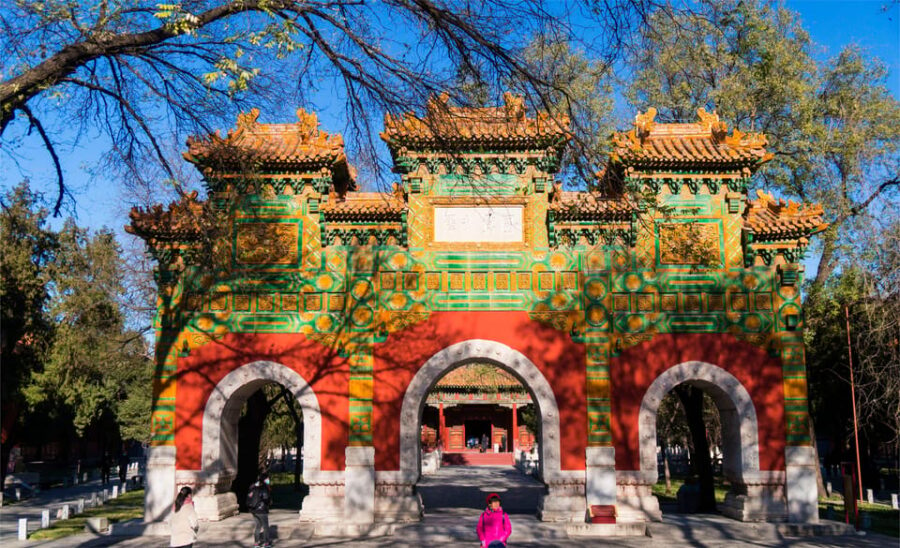
The e-tickets for the Beijing Confucius Temple and Imperial College cost from $7.20 per person.
Visitors can reserve their tickets now and pay later. There’s also a free cancellation option up to 24 hours in advance for a full refund.
The tickets are valid for 1 day, so visitors can check availability for their preferred starting times. Guests can skip the ticket line and enjoy wheelchair accessibility.
E-ticket entry is available using a QR code and passport.
Here are more great tours and experiences we've reviewed in Beijing
Historical Significance
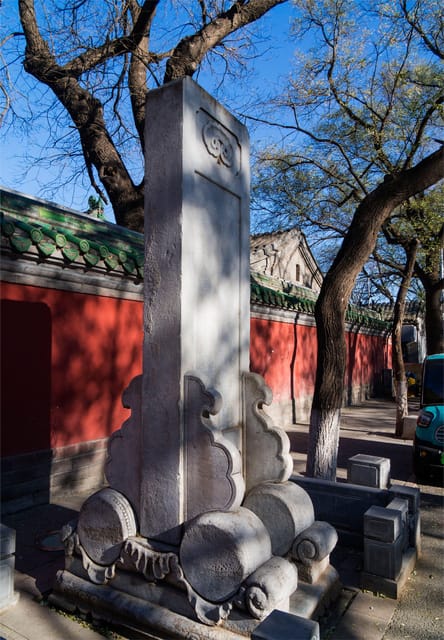
Beijing’s Confucian Temple and Imperial College boast over 700 years of history, with their construction dating back to the Yuan Dynasty in the 14th century.
The Confucius Temple was built in 1306 and served as the site of memorial ceremonies during the Yuan, Ming, and Qing Dynasties. Covering over 22,000 square meters with a construction area of 7,400 square meters, the complex features three courtyards.
The Imperial College, established in 1308, spans 28,000 square meters with three courtyards and key structures like the Jixian Gate and Taixue Gate.
These historic sites are invaluable for research on Chinese imperial examinations, with 198 stone tablets containing 51,624 names.
Architectural Features
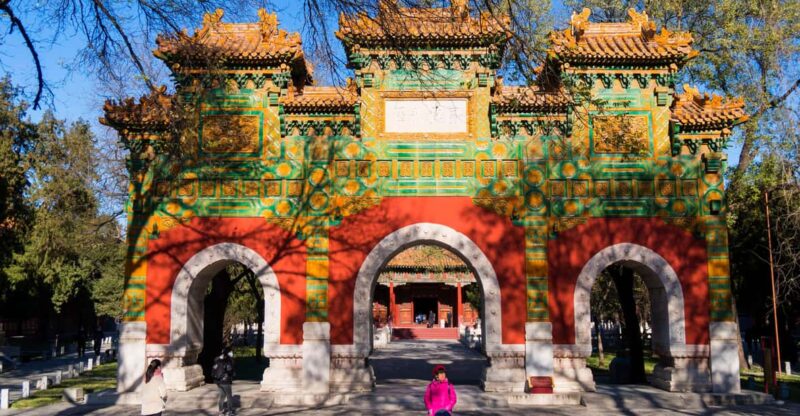
The Confucius Temple’s architectural centerpiece is the Teacher Gate, leading to the Dacheng Gate and the grand Dacheng Hall, which served as the main worship and ceremonial area. The temple also features 198 stone tablets with 51,624 names, a valuable resource for researching China’s imperial examination system.
The adjacent Guozijian (Imperial College) covers 28,000 square meters with three courtyards. Key structures include the Jixian Gate, Taixue Gate, Glazed Memorial Arch, Biyong Hall, Yilun Hall, and Jingyi Hall.
| Architectural Features | Description |
|---|---|
| Confucius Temple | Teacher Gate, Dacheng Gate, Dacheng Hall, Chong Sheng Temple |
| Imperial College | Jixian Gate, Taixue Gate, Glazed Memorial Arch, Biyong Hall, Yilun Hall, Jingyi Hall |
Confucian Temple Exhibitions
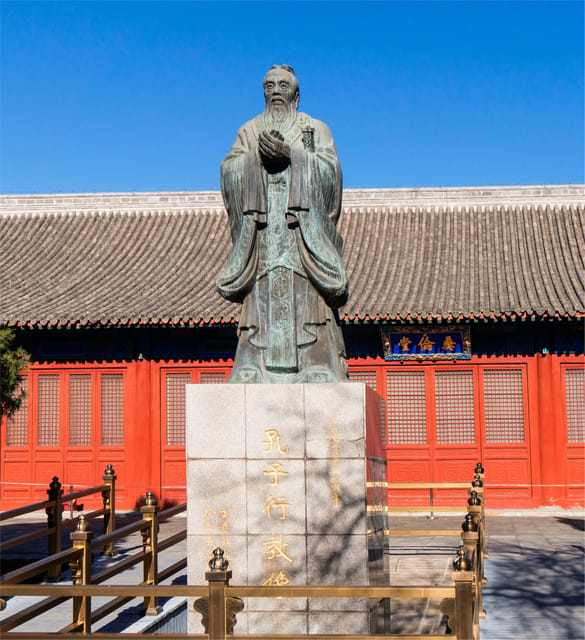
Exhibitions within the Confucian Temple showcased the site’s rich history and cultural significance.
Among the highlights was the restored Dacheng Hall, which offered visitors a glimpse into the temple’s architectural marvels from the Yuan Dynasty.
The "Great Confucius" exhibit paid tribute to the renowned philosopher, while the "History of Beijing Confucius Temple" provided insights into the temple’s evolution over centuries.
Plus, the temple housed a collection of Yuan Dynasty cultural relics, allowing visitors to enjoy the artistic and historical treasures of that era.
These diverse exhibitions ensured that a visit to the Confucian Temple was both educational and captivating.
More Great Tours NearbyImperial College Attractions
Guozijian, or the Imperial College, stood as a key component of the expansive Confucian complex in Beijing. Established in 1308, the Imperial College covered 28,000 square meters with three courtyards. Its key structures included the Jixian Gate, Taixue Gate, Glazed Memorial Arch, Biyong Hall, Yilun Hall, and Jingyi Hall.
| Key Structures | Purpose |
|---|---|
| Jixian Gate | Served as the main entrance |
| Taixue Gate | Led to the central courtyard |
| Glazed Memorial Arch | Commemorated the imperial examination system |
The Imperial College played a vital role in China’s educational legacy, serving as a hub for training the country’s future scholars and bureaucrats.
- Beijing Mini Group Day Tour: Mutianyu Great Wall, Forbidden City
- 4-Hour Private Beijing Walking Tour of the Forbidden City
- 4-5 Hour Beijing Layover Tour to Mutianyu Great Wall
- Full-Day Small-Group Great Wall Hike: Simatai West to Jinshanling
- 4-Hour Small Group Tour to Forbidden City With Entry Tickets
- Mubus: Mutianyu Great Wall Bus Tour (8:00am & 10:00am)
Visitor Requirements
Visitors to the Beijing Confucian Temple and Imperial College will need to provide their passport or ID card to enter the attractions.
The QR code from GetYourGuide isn’t the actual ticket – the real ticket will be sent via email. Travelers must provide their full name and passport number for each participant to the tour operator by email.
Upon arrival, visitors should enter with their original passport and the electronic tickets received.
With these simple requirements, guests can easily access the 700-year-old Confucian landmarks and enjoy China’s rich history and cultural heritage.
Ticket Purchase Details
Travelers can purchase tickets for the Beijing Confucian Temple and Imperial College from $7.20 per person.
The e-tickets offer a convenient skip-the-line entry, and a reserve now and pay later option is available. Visitors can enjoy free cancellation up to 24 hours in advance for a full refund.
The tickets are valid for one day, with flexibility in choosing the starting time. Wheelchair-accessible facilities are provided, and entry is via QR code and passport.
It’s important to note that the QR code from Get Your Guide isn’t the actual ticket – the real ticket will be emailed to the customer.
Customer Ratings and Reviews
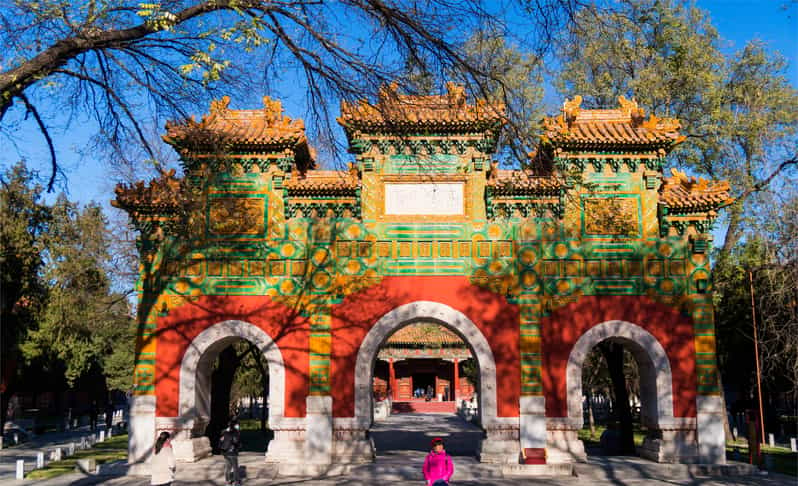
According to customer reviews, the Beijing Confucius Temple and Imperial College e-tickets have earned a rating of 4.6 out of 5 based on 5 reviews.
Reviewers have praised the convenience of the e-ticket option, which allows them to skip the ticket line and access the attraction using their mobile device. Customers also appreciate the free cancellation policy, which gives them flexibility in their travel plans.
Frequently Asked Questions
Is Audio Guide Available for the Tour?
An audio guide is not mentioned in the information provided. The ticket details focus on the historical significance, architectural features, and exhibitions of the Confucius Temple and Imperial College, but do not indicate whether an audio guide is available for visitors.
Can I Take Photographs Inside the Temples?
Yes, visitors are generally allowed to take photographs inside the temples, but they should be respectful and avoid disrupting any ongoing ceremonies or events. Some areas may have restrictions, so visitors should check with staff upon arrival.
Are There Any Dining Options Within the Complex?
The Confucius Temple and Imperial College complex offers several dining options within its grounds. Visitors can find traditional Chinese restaurants and snack bars serving local cuisine to refuel during their visit.
How Long Does It Typically Take to Explore the Entire Site?
The entire Confucius Temple and Imperial College complex takes about 2-3 hours to explore thoroughly. Visitors can expect to see the main temples, courtyards, and exhibits highlighting the site’s 700+ years of history and cultural significance.
Is There a Dress Code or Any Specific Attire Required?
There is no specific dress code required to visit the Confucius Temple and Imperial College. Visitors can wear comfortable, casual clothing. Modest attire is recommended out of respect for the historical significance of the site.
The Sum Up
The Confucius Temple and Imperial College in Beijing offer a unique opportunity to explore the rich cultural heritage of China. With skip-the-line entry, flexible booking, and a full refund policy, visitors can easily explore these historic sites and gain insights into Confucian education. The well-preserved architecture and exhibitions provide an immersive experience, making it a must-visit destination for anyone interested in Chinese history and culture.
You can check availability for your dates here:More Tickets in Beijing
- Juyongguan Great Wall Entrance Ticket With Guide&Transfer Service
- Jinshanling Great Wall QR Code Tickets Reservation
- Confucius Temple and Imperial College Entrance Ticket
- Beijing Lama Temple Entrance Ticket With Optional Guided Service
- The Old Summer Palace (Yuanmingyuan) Entrance Ticket
- Beijing Mutianyu Great Wall Entrance Ticket With Transfer Service
More Tour Reviews in Beijing
- Shanghai Era Theatre Acrobatics Show Ticket
- 12-day Tour: Real China Highlights
- Beijing Culture Tour: Chinese Traditional Painting and Mutianyu Great Wall With Cable Car Ride
- Jiankou Great Wall Hiking
- Private Day Tour: Mutianyu Great Wall and Lama Temple
- 6-Day Beijing Xian Tour, Private Package to Great Wall and Terracotta Army
Not for you? Here's more things to do in Beijing we have recnetly reviewed
- 20 Best 2 Day Tours In Beijing
- 20 Best 3 Day Tours In Beijing
- 16 Best 4 Day Tours In Beijing
- 25 Best Dining Experiences In Beijing
- 10 Best Full-Day Tours In Beijing
- 20 Best Private Car With Driver Services In Beijing
- 25 Best Dinner Tours In Beijing
- 25 Best Cruises And Boat Tours In Beijing
- 25 Best Lunch Experiences In Beijing
- 25 Best Food Tours In Beijing
- Private All-Inclusive Great Wall Camping Trip at Jinshanling
- Gran Canaria Airport Departure (Playa Del Inglés Hotels to Lpa)
